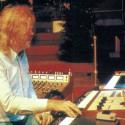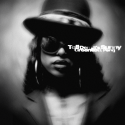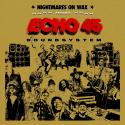Gary Numan famously has a devoted fanbase. For this album he had a live video feed that allowed them, for a small fee, to watch him in the studio, working on it from conception to completion. Unlike any of his peers from the post-punk years, he draws new young fans to his contemporary releases. His 21st century career has seen him growing more and more gothic, heading far into industrial-electronic Nine Inch Nails territory, albeit with his own twist. He is many leagues away from the pristine synth-pop that made his name circa 1979-81.
Numan’s last few albums have grown progressively more and more morose, sacrificing his pop sensibilities at the altar of gloom’n’doom. The last one, Splinter (Songs From a Broken Mind), was unremittingly dirge-like. Savage, however, has an unlikely bounce, and is the best thing he’s done in at least a decade. It’s a concept piece, imagining a future world where resources are gone, all is desert, where “human kindness and decency are just a dim and distant memory”. Numan always had a thing for sci-fi. Indeed, post-apocalypyic Mad Max imagery influenced one of his less successful mid-Eighties looks. Savage is, then, as gloomy as ever, overlaid with Numan’s ongoing focus on biblical imagery and the perils of Christian dogma. What makes it is the sound, which is amped, widescreen, techno and adventurous.
Co-producer Ade Fenton has long been Numan’s partner in the studio, and he excels himself here. Songs such as “Ghost Nation” and “My Name Is Ruin” have a crunchy, granular electronic feel, but are also epic. And for fans of “the old stuff” there are even hints of the minor key synth riffs that originally made Numan’s name (especially on “What God Intended”). Numan moved to LA a few years ago and it’s as if the hugeness of the landscape has filtered into his music.
From “Bed of Thorns” to Vangelis-like closer “Broken”, there’s also a heavy Middle Eastern flavour to the album’s melodic make-up, a muezzin wail translated to stadium electronics. The lyrics, of course, run along the lines of “I’ll show you ruin/I’ll show you heartbreak/I’ll show you loving/And sorrow and darkness”, but this time he’s unafraid of a big chorus. You can imagine “When the World Comes Apart” being sung en masse by fans.
Gary Numan’s latest album surprises by taking what he’s been steadily doing for a decade and a half, and reinventing it, boosting it, increasing its vibrancy and electronic power.
Overleaf: watch the video for Gary Numan "My Name is Ruin"















Add comment